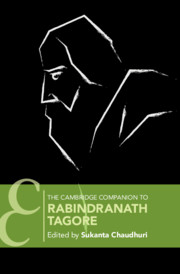Book contents
- Frontmatter
- Contents
- List of Illustrations
- Notes on Contributors
- Preface
- Note on Conventions and Practices
- 1 Rabindranath Tagore: From Art to Life
- 2 A Garland of Many Tagores
- Part I Overviews
- 3 Rabindranath and His Times
- 4 Tagore's Poetry: An Overview
- 5 ‘Something of a Musician’: Tagore's Songs
- 6 Rabindranath Tagore: Drama and Performance
- 7 Imagined Worlds: The Prose Fiction of Rabindranath Tagore
- 8 The English Writings: An Overview
- 9 Tagore and Indian Literature: Influence and Presence
- 10 Rabindranath Tagore and Literary Communication across Borders
- 11 Tagore and the Visual Arts
- Part II Studies
- List of Tagore's Works Cited, with Index
- Further Reading
- General Index
10 - Rabindranath Tagore and Literary Communication across Borders
from Part I - Overviews
Published online by Cambridge University Press: 24 December 2019
- Frontmatter
- Contents
- List of Illustrations
- Notes on Contributors
- Preface
- Note on Conventions and Practices
- 1 Rabindranath Tagore: From Art to Life
- 2 A Garland of Many Tagores
- Part I Overviews
- 3 Rabindranath and His Times
- 4 Tagore's Poetry: An Overview
- 5 ‘Something of a Musician’: Tagore's Songs
- 6 Rabindranath Tagore: Drama and Performance
- 7 Imagined Worlds: The Prose Fiction of Rabindranath Tagore
- 8 The English Writings: An Overview
- 9 Tagore and Indian Literature: Influence and Presence
- 10 Rabindranath Tagore and Literary Communication across Borders
- 11 Tagore and the Visual Arts
- Part II Studies
- List of Tagore's Works Cited, with Index
- Further Reading
- General Index
Summary
Literature, to Rabindranāth Tagore, is an expression of being-in-relation. According to him, affective bonds with truth lead to relations of reciprocity where one wants to give back to the world in equal measure what one has received, piling up the offerings with ‘word and voice, brush and hone’. What, we wonder today, could be the implications of his idealistic standpoint across borders, in the context of global reception? This essay will take up the question and situate it within the matrix of interliterary communication from several perspectives. It will focus on the various premises of communicative acts with relation to literature in multiple reading communities, and the consequent areas of interaction involving hermeneutic impulses in approaching the texts. It will then take up areas of mutuality and transformation, the function and value of Tagore's texts in different cultures, instances of non-communication, and, finally, shifts in the mechanism of transfer in the contemporary context. This study will help us to look at the dynamics of interliterary communication in the global context, framed by organizational structures on the one hand and, on the other, by literature's ability to create its own relations and extend in many directions, generating semantic and cultural tensions as well as resolutions.
There are layers of interculturality at the core of Tagore's literary work. Before looking at his communication with the wider world, we need to briefly consider the meaning and function of his oeuvre in its immediate cultural milieu. He produced an immense body of work in almost every conceivable verbal genre. But to his own people, he is primarily a poet, and his greatest gift to them, across socio-economic groups, is a major corpus of song poems. His community found in his works a new language for a meaningful, layered, and sophisticated expression of the many varied moments of its intimate experiences, and it is this that has ensured his lasting living presence among the people of Bengal. At the same time, he played an important role in the life of the nation and was drawn into larger civilizational questions in complex circumstances during and between the two Great Wars.
- Type
- Chapter
- Information
- The Cambridge Companion to Rabindranath Tagore , pp. 202 - 221Publisher: Cambridge University PressPrint publication year: 2020



